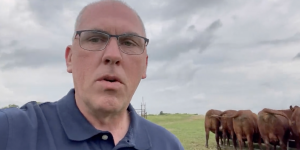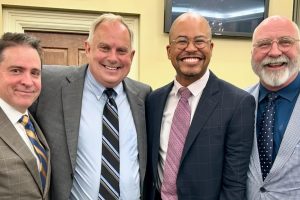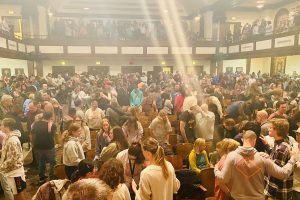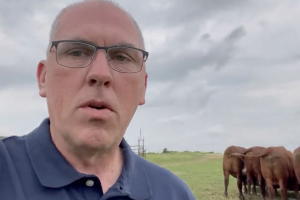 My career in cross-cultural missions has spanned more than 50 years, half of them spent as a Baptist missionary in Asia. For the last 20 years before retirement, I taught missions as a faculty member of two seminaries affiliated with the Cooperative Baptist Fellowship. From both my practical experience on the field and my academic involvement in research, teaching, writing and taking students on study abroad seminars on four continents outside the United States, I have observed two overarching methodologies for presenting Jesus to the world.
My career in cross-cultural missions has spanned more than 50 years, half of them spent as a Baptist missionary in Asia. For the last 20 years before retirement, I taught missions as a faculty member of two seminaries affiliated with the Cooperative Baptist Fellowship. From both my practical experience on the field and my academic involvement in research, teaching, writing and taking students on study abroad seminars on four continents outside the United States, I have observed two overarching methodologies for presenting Jesus to the world.
One way is to introduce Jesus primarily through verbal communication – preaching, teaching and personal evangelizing.
“There are at least two ways to present Jesus to the world. One depends primarily on words; the other is expressed through a lifestyle that exhibits itself largely in deeds.”
For one Baptist mission organization in the U.S., evangelism is the goal and method considered superior to all others. Winning people to faith in Christ is the primary task, and in its simplest form success is measured by increases in the number of baptisms, Bible study groups and new church starts. The majority of a missionary’s time – at one time calculated at 70% of all of his or her activities and work – should be spent in evangelism and church planting efforts. Following this guideline, other approaches to ministry, such as theological education, medical work, publications, writing and the arts, agriculture and other forms of social ministry were considered secondary, and in some settings around the world were defunded. If carried out, these lesser ministries were considered the means to an end, a technique to open the door to evangelization.
This strategy didn’t discount nonverbal communication of the gospel, but emphasized verbal witnessing and indirectly attributed more status, even if only subtly, to those missionaries whose spiritual gifts made them effective evangelists. The urgency to “save the lost” before it was too late became the motivating impulse that took many missionaries to “unreached” population centers around the world and kept them engaged in programs intended to lead people to conversion.
The other way is to present Jesus unapologetically through a benevolent response to human need, disease and dis‑ease, poverty, hunger and homelessness, addiction, sexual abuse and trafficking, illiteracy, climate change and natural disaster, interpersonal conflict and interreligious tensions.
Consequently, for another U.S.-based Baptist mission organization, neighborhood social centers, mobile clinics, orphanages and schools, rescue houses for the abused and trafficked, cottage industries, disaster relief teams, cow banks, work training sites and interfaith dialogue groups are valued ways of reaching out to people with the love of Christ. It is not that evangelism is unimportant, for out of the interface of persons who are hurting and the compassionate Christians who stand alongside them will naturally emerge opportunities to give what might be called “the answering witness.” This occurs when the one in pain asks the one who cares, “Why are you so unlike those who ignore or mistreat me?” The believer can then answer that Jesus is the one who makes the difference.
Social ministry is not a gimmick; nor should it produce what, in the history of missions, has been called “rice Christians” – people who claim to believe just as long as the donated rice to address hunger or famine doesn’t run out. Instead, this way of presenting Jesus to the world is focused first upon imitating the person Peter described to Cornelius, one who “went about doing good and healing all who were oppressed by the devil” (Acts 10:38). It agrees with the proverbial maxim that it is fundamental to give bread to the famished before speaking to them of the Bread of Life.
Of course, the way to present Jesus to the world is not an either/or choice. It is important to reach out to people who are hurting with the compassion that Jesus showed to the individuals and crowds of his own time. It is also important to be able to tell people that Jesus is the one who has inspired our good actions toward and for them, their families and communities because of what he taught and how he lived – in other words, to introduce them to the one we have chosen to follow. This is the theme of an evenhanded book by Baptist ethicist Ronald J. Sider published in 1993. In Good News and Good Works: A Theology for the Whole Gospel, Sider demonstrates that both evangelism and social ministries are central to the gospel.
At times, however, this symbiotic relationship between being a compassionate person in the world and verbally witnessing about Jesus to the world has become imbalanced.
This unnecessary dichotomy was evident near the end of our time as international missionaries. It happened at an annual retreat of some 150 members of our local Baptist organization. The preacher for one of the closing sessions was our immediate supervisor from the mission agency. He concluded his sermon with a question: “When you ride down the street of your city and see the thousands of people along the streets – people who are lost without Jesus as their Savior – does your heart break because of their lostness?”
Immediately something stirred in my soul. After the benediction, I said privately to this visitor, “No, when I ride down the streets of my city, and I see the thousands of people along the streets, my heart does not break because they don’t know Jesus.” Instead, I said, “My heart is filled with joy, because I love these people, their culture, their language – and, yes, their religious paths in which so many have found meaning and fulfillment and from which I have learned much that has made me a better Christian.”
This exchange was a difference of opinion between friends, both Christians for decades, both seminary-educated and experienced in cross-cultural ministry, both of whom loved the people on my streets. But my way of loving them was first to affirm them as persons by getting to know their culture, language and religious paths, while his way of loving them was to think first of their lostness and the urgency to convert them to Christianity.
“The urgency to ‘save the lost’ before it was too late became the motivating impulse that took many missionaries to ‘unreached’ population centers around the world.”
As I have taken students from Logsdon Seminary on international journeys of discovery and learning, these two methods of presenting Jesus to the world have become clear, not only to me but to my students. On several of our trips back to the country where my wife and I served a quarter century, we were hosted in different cities by personnel from each of these two Baptist mission agencies. In our debriefing sessions, as well as in their required journals that I read and evaluated, students often noted their bewilderment over the distinctions between the approaches they had observed.
For example, a missionary evangelist in one city divided the students into four teams and gave them bundles of gospel tracts written in the local language. He then sent them out to walk along four busy boulevards where each was instructed to hand out, one by one, their allotment of 50 evangelistic pamphlets to people they encountered. When a student asked how they could communicate with recipients of the pamphlets, they were told they didn’t need to talk, other than to offer a two-word phrase they should memorize, meaning “this is free.” Our host explained that the purpose was to get God’s Word into the hands of people who needed to be saved, people who would take anything offered them that was free – some of whom hopefully would telephone the number provided.
On another day of our trip, we visited a site in the mountains where clay was mixed with rice straw, molded into large jars and fired in a kiln to produce inexpensive water filtration devices for nearby villagers. But the students were told that while making pure drinking water available for poor people was a good thing, if they never heard about Living Water to quench their spiritual thirst then it would be an empty exercise.
In that nation’s capital, a church planter told us proudly that he had designed a witnessing technique whereby national Christians he was training could present the whole gospel message to someone in 15 minutes. He added that he had told his team members that if a person refused to believe after being extended a clear witness and invitation, they should leave and move on to someone else, since there were millions in the city without Christ.
These statements and actions that illustrate a stress upon a Good News theology that seems to discount establishing friendships or responding to human need deeply puzzled some of my students.
Alternately, missionaries from the other organization described to us their humanitarian and relationship-building work. They recounted their responses to natural and human-made disasters. They talked about combating sex trafficking and the abuse of children through educational programming with local social agencies and international schools.
They spoke of their work in the arts – painting, dance and orchestrations using indigenous instruments – and shared stories of getting to know famous local artists as well as learners from around the world who had come to their island to experience and aesthetically capture the beauty for which it was famous.
When these missionaries did not talk about any involvement in traditional forms of evangelism, detailing instead a Good Works theology, other students were concerned. Consequently, these seminarians felt compelled to choose between the two methodologies. Some supported the evangelistic strategy employed by one group of missionaries while others affirmed the social and humanitarian actions carried out by the others we encountered on our journey. Perhaps these preferences were determined by each person’s sense of calling and their spiritual giftedness.
Christians conceive of their ministries differently. Because of my own calling and cluster of abilities, I present Jesus to the world through establishing personal relationships and advocating for various forms of justice. This self-awareness has shaped how I have lived my faith, developed my theology, taught my students and written about my convictions
“At times, this symbiotic relationship between being a compassionate person in the world and verbally witnessing about Jesus to the world has become imbalanced.”
An important book in my personal missions library is an autobiographical account written by a Maryknoll Catholic missionary to Bangladesh, Bob McCahill (Dialogue of Life: A Christian Among Allah’s Poor, 1996). When moving to a new assignment from his seminary teaching responsibilities in the southern Philippines, McCahill was given permission by his order to minister in his own way, so he chose to make his home in the poorest village he could find. Living in a hut with a dirt floor, with no electricity, running water or toilet, with only a woven mat for his bed and one gas burner and pot to cook his rice, he began to befriend his neighbors. His ministry was simple: helping anyone who needed his aid, taking anyone who was ill to a distant clinic and paying for their treatment and care, sitting for hours talking about life with many curious yet gracious villagers and living exactly at the same poverty level as they.
McCahill’s way of presenting Jesus to the world around him was largely non-verbal. When challenged by educated Bangladeshis about his agenda, about why an American who could live at a much higher standard would choose to stay in that desperately poor village, the men and women Bob had helped – those who were crowded around to listen – would speak up before he had a chance to answer. “He’s here because he’s a Jesus follower,” they would say. “That’s how Jesus followers live.”
A poignant and profound incident during one of my study abroad journeys illustrates the two techniques of witness – and convinces me that one is often more effective than the other. The students and I had spent the afternoon visiting a slum where garbage workers and their families had made their home in a largely unseen corner of the massive city of 10 million. While some of our group sang and visited with young children and told them and their mothers simple stories about God’s love, others played soccer with older children and teenagers on a rocky, open field next to the huddle of dwellings made of bamboo, torn tarpaulin and plastic string.
At one point in the afternoon, our evangelist host attempted to gather the boys and young men to hear an explanation of the path to salvation and sanctification, represented by the colors – black, red, white, green and gold – of his soccer ball, which he had told us was his “evange-ball.” Very few of the players seemed interested in his verbal explanation, and most faded away to the periphery, though he was speaking their language and was friendly and even winsome.
When the game continued, it wasn’t long until a youngster, maybe 10 years old, cut his foot on a sharp piece of trash. One of my students quickly got a First Aid kit out of his backpack. He sat the boy down and, taking his dirty and bleeding foot in his hand, gently cleaned, medicated and bandaged the wound. A crowd of fascinated teenagers and adults crowded around to watch. They were startled and intrigued by the compassion of this foreigner.
My student couldn’t speak the local language. He had no tracts to distribute, no “words of life.” What he did have, however, was clearly appreciated – medicine for a child of their village, a tenderness in his touch and smile, and a willingness to get his hands dirty.
There are at least two ways to present Jesus to the world. One depends primarily on words; the other is expressed through a lifestyle that exhibits itself largely in deeds. Good News and Good Works. While I recognize the wisdom of a balanced witness, one of these seems more effective to me. And, according to the Parable of the Last Judgment (Matthew 25:31-46), it seems also to have been the way affirmed by Jesus.



































































